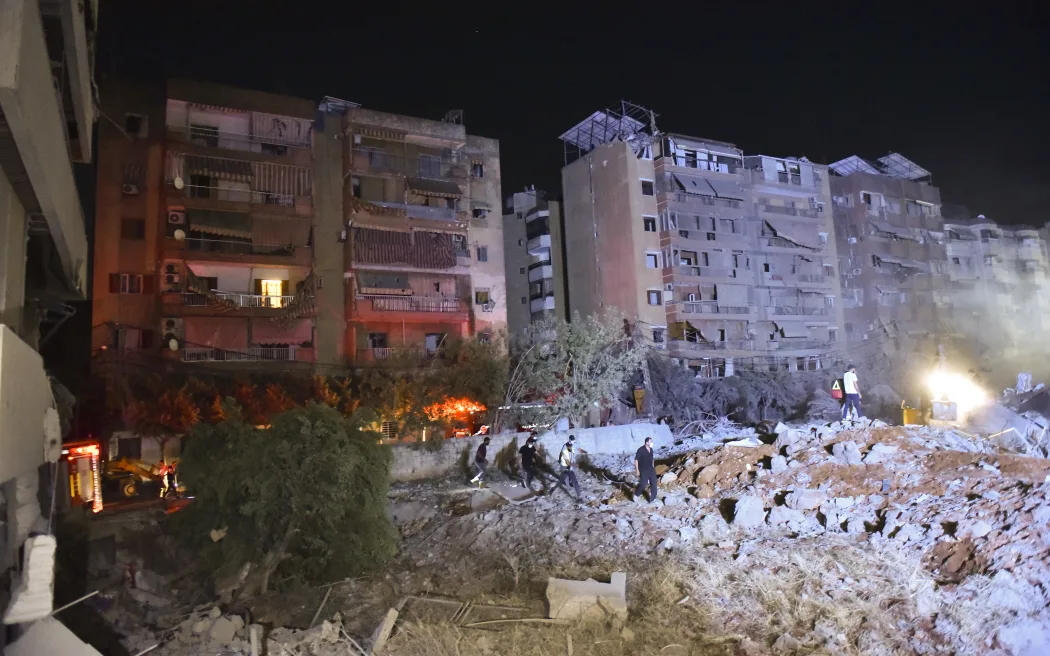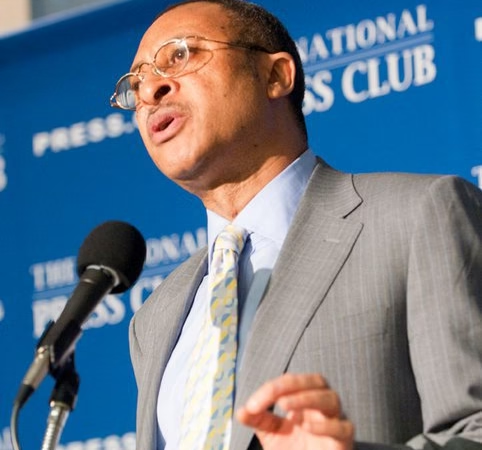Israel In A Major Attack, Destroys Hezbollah’s Headquarter In Beirut

The Israeli military announced Friday that it had attacked Hezbollah’s central headquarters in Beirut. A series of massive explosions toppled several buildings and sent orange and black smoke billowing into the sky, making it the largest explosion to hit the Lebanese capital in a year.
Three major Israeli television stations said Hezbollah leader Hassan Nasrallah was the target of the attack in the southern suburb of Beirut. The Associated Press could not immediately confirm the unsourced reports, and the military declined to comment. However, the scale and timing of the bombing strongly suggests that the senior leader may have been inside the attacked building.
Not waiting until Saturday evening, the end of the Sabbath, Prime Minister Benjamin Netanyahu abruptly cut short his visit to the United States and returned home. Hours earlier, Prime Minister Netanyahu had addressed the United Nations and vowed that Israel’s operation against Hezbollah would continue.
As Prime Minister Netanyahu was briefing the accompanying press corps, news of the bombing broke. A military aide whispered in his ear, and Prime Minister Netanyahu quickly ended the briefing.
Israel announced dozens of new airstrikes on Lebanon’s Hezbollah strongholds on Tuesday, a day after more than 490 people, including dozens of women and children, were killed in the first bombardment since the devastating war in 2006.
According to Israeli military spokesman Major General Daniel Hagari, the target of the airstrike was the Hezbollah command center, located in the basement of a residential building. Six buildings in the Haret Hreik neighborhood of Dahiyeh were reduced to rubble, according to Lebanon’s state-run news agency. The explosion, about 30 kilometers (18 miles) north of Beirut, rattled windows and shook houses. Ambulances were seen heading to the scene with sirens blaring.
The Pentagon said Friday that the U.S. had received no advance warning of the heavy airstrikes in Beirut.
Israel dramatically stepped up airstrikes in Lebanon this week, expressing its determination to end more than 11 months of Hezbollah bombardment of its territory. The scope of Israel’s operation is still unknown, but officials say a ground invasion to keep Hezbollah away from the border is also possible. Israel is moving thousands of troops toward the border in preparation.
At least 25 people were killed in an Israeli military attack early Friday morning, bringing the death toll in Lebanon this week to more than 720, Health Minister Firas Abiad announced. Dozens of women and children are among the dead, he said.
In the predominantly Sunni border town of Chebaa, an airstrike hit a house early Friday, killing nine members of the same family, according to the state-run news agency. Those killed were Hussein Zahra, his wife Latiba, their five children and two grandchildren, according to residents.
Prime Minister Netanyahu vowed at the UN that Israel would “continue to degrade Hezbollah” until it achieved its goals.
Netanyahu’s remarks dampened hopes for U.S. support for a 21-day ceasefire between Israel and Hezbollah to allow time for a diplomatic solution. Hezbollah has not responded to the proposal.
Hezbollah, Lebanon’s most powerful armed group backed by Iran, began firing rockets at Israel immediately after the Hamas attack on October 7, saying it was a show of support for the Palestinians. Since then, daily firefights with Israeli forces have been taking place, forcing tens of thousands of people to flee their homes on both sides of the border.
One Israeli security official said he expects the possibility of war with Hezbollah will not last as long as the current war in Gaza, as Israeli military targets are much narrower.
In Gaza, Israel has declared that it will dismantle the Hamas military and political regime, while its only goal in Lebanon is to keep Hezbollah away from the Israeli border.
The Israeli military said it attacked the southern neighborhoods, including Sidon and Nabatiyeh, dozens of times over a two-hour period. They said they targeted Hezbollah rocket launchers and infrastructure. Hezbollah said it fired rockets at the northern Israeli city of Tiberias.
In the southern Lebanese city of Tireh, civil defense workers pulled the bodies of two women, 35-year-old Hiba Ataya and her mother, Saba Oryan, from the rubble of a building destroyed by a strike. ‘Saba, these are Saba’s clothes, my dear,’ one man exclaimed as her body was pulled out.
According to Israel, the attacks, which accelerated this week, have already caused significant damage to Hezbollah’s weapons capabilities, and the attacks have led to the assassination of a number of Hezbollah’s top commanders. Officials noted that the limited missile and rocket launches over the past week indicate that Hezbollah is retreating.
However, Hezbollah possessed a large number of rockets and missiles.
Hezbollah officials and their supporters remain defiant. On Friday evening, shortly before the explosion, thousands of people had gathered at another location outside Beirut for the funeral of three Hezbollah members killed in an earlier airstrike, including Mohammed Suroor, the head of Hezbollah’s drone unit.
Men and women in the huge crowd raised their fists and chanted “We will never accept humiliation” as they marched behind the three coffins, which were wrapped in Hezbollah’s yellow flag.
Hussein Fadlallah, Hezbollah’s top official in Beirut, said in a speech that no matter how many commanders Israel kills, Hezbollah has an infinite number of experienced fighters deployed all over the front lines. Fadlallah vowed that Hezbollah will continue to fight until Israel stops its offensive in Gaza.
He said, “We will not abandon our support for Palestine, Jerusalem, and oppressed Gaza. ‘There is no neutral ground in this fight.



